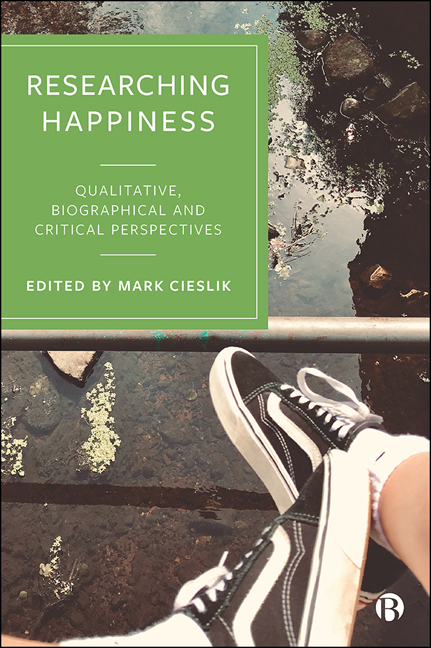Book contents
- Frontmatter
- Contents
- List of Figures and Tables
- Notes on Authors
- 1 Introduction: Developing Qualitative Research into Happiness and Wellbeing
- Part I Qualitative Research into Happiness/Wellbeing: Theories, Debates and Issues
- Part II Qualitative Research into Happiness/Wellbeing: Communities, Biographies and Identities
- Part III Qualitative Research into Happiness/Wellbeing: Methodological Innovations
- Index
10 - A Board Game Approach to Studying the Multidimensionality of Life Satisfaction
Published online by Cambridge University Press: 22 December 2021
- Frontmatter
- Contents
- List of Figures and Tables
- Notes on Authors
- 1 Introduction: Developing Qualitative Research into Happiness and Wellbeing
- Part I Qualitative Research into Happiness/Wellbeing: Theories, Debates and Issues
- Part II Qualitative Research into Happiness/Wellbeing: Communities, Biographies and Identities
- Part III Qualitative Research into Happiness/Wellbeing: Methodological Innovations
- Index
Summary
Introduction
Happiness research has gained extraordinary popularity in recent years, both among scholars and governments as well as the public. Research by anthropologists and sociologists on the topic remains limited in comparison with research by economists and psychologists (see Introduction by Cieslik, this volume). Despite the multitude of studies undertaken, our knowledge about happiness in Japan continues to be limited for a number of problems that boil down to methodology. Large-scale quantitative surveys on happiness and wellbeing that suggest the Japanese are unhappy in comparison with other highly developed societies, often rely on a single-item measurement of ‘overall happiness’ or in conjunction with objective indicators of ‘overall well-being’ (Helliwell, Layard and Sachs, 2016; OECD Stat, 2017); and hardly ever is the meaning of happiness and its universal importance in human life questioned (Uchida et al, 2015).
It is desirable, therefore, that sociological research is sensitive to the cultural construction of happiness and its multidimensional nature in Japan. In the two most recent edited volumes on happiness and wellbeing in Japan we presented novel findings from qualitative as well as quantitative researchers (Holthus and Manzenreiter, 2017b; Manzenreiter and Holthus, 2017b). Yet most contributions focused on singular or select factors, such as age, friendship, parenthood, or political participation, to name but a few. Only Mathews (2017) paid tribute to the diversity of definitions in the understanding of happiness and life satisfaction in Japan.
In the following, we present a three-part innovative approach to studying happiness and life satisfaction. This methodology attempts to be sensitive to the gaps in the literature, as it enquires about definitions of happiness and happiness-related terms, and it allows interviewees to explain their lives and weight elements in their lives as to (1) their importance for living a good life and (2) to their positive and negative evaluation. To test the methodology, we conducted semi-structured interviews with 23 men and women in Japan. Each interview consists of three parts: (a) word association, (b) in-depth conversation on happiness issues using a bullseye structured chart, often referred to by us and the interviewees as a ‘board game’, together with tokens for visualization of factors of satisfaction and dissatisfaction, and (c) three written quantitative questions on happiness, all to be discussed indepth with the interviewees thereafter.
- Type
- Chapter
- Information
- Researching HappinessQualitative, Biographical and Critical Perspectives, pp. 199 - 218Publisher: Bristol University PressPrint publication year: 2021



